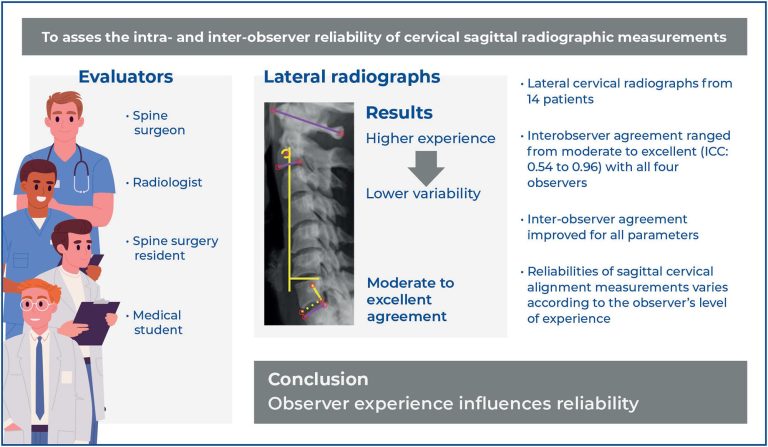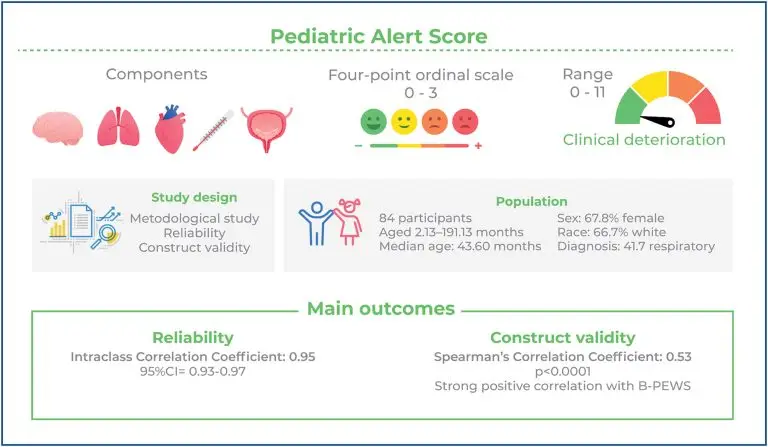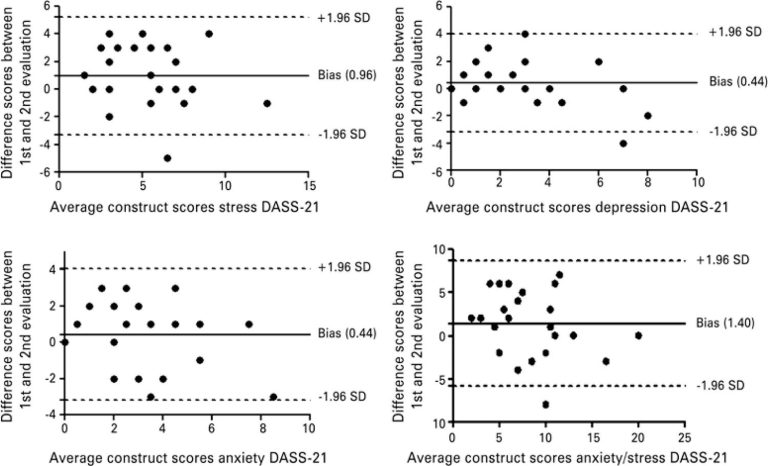13/Nov/2025
Intra- and inter-observer reliabilities of cervical sagittal radiographic measurements among evaluators with different levels of training
einstein (São Paulo). 13/Nov/2025;23:eAO1947.
View Article13/Nov/2025
Intra- and inter-observer reliabilities of cervical sagittal radiographic measurements among evaluators with different levels of training
DOI: 10.31744/einstein_journal/2025AO1947
Highlights ■ Observer experience improves radiographic measurement reliability. ■ Spine surgeons and radiologists exhibited the highest intra-class correlation coefficients. ■ The cervical sagittal vertical axis showed the greatest inter-observer variability. ■ Standardized training may enhance measurement consistency. ABSTRACT Objective: To assess the intra- and inter-observer reliabilities of cervical sagittal radiographic measurements performed by evaluators with varying levels of clinical experience. Methods: This study analyzed lateral cervical radiographs from 14 patients who had undergone single-level anterior cervical discectomy and fusion. Four […]
Keywords: Cervical vertebrae; Diskectomy; Observer variation; Radiographic image interpretation, computer-assisted; Radiologists; Reproducibility of Results; Spinal fusion; Spine; Students, medical; Surgeons
05/Jun/2025
Pediatric Alert Score: evaluation of measurement properties
DOI: 10.31744/einstein_journal/2025AO1214
Highlights ■ Clinical deterioration is a global concern related to patient safety. ■ The Pediatric Alert Score includes assessments of neurological, respiratory, and cardiovascular conditions; temperature; and urine output. ■ The Pediatric Alert Score demonstrated high reliability and strong validity with the B-PEWS-Br. ■ The Pediatric Alert Score is a reliable tool for detecting clinical deterioration and improving patient safety. ABSTRACT Objective: To evaluate the construct validity and reliability of the Pediatric Alert Score in hospitalized children and adolescents. Methods: […]
Keywords: Child, hospitalized; Clinical deterioration; Early Warning Score; Pediatric nursing; Reproducibility of Results; Validation study
03/Feb/2022
Validity and reliability of the Smoking-related Health Literacy Assessment Scale
einstein (São Paulo). 03/Feb/2022;20:eAO5156.
View Article03/Feb/2022
Validity and reliability of the Smoking-related Health Literacy Assessment Scale
DOI: 10.31744/einstein_journal/2022AO5156
ABSTRACT Objective To create an instrument to assess smoking-related health literacy among smokers, and to estimate validity of its content and reliability. Methods A methodological, quantitative study. The creation of the instrument included the following steps: establishing a conceptual structure; defining objectives and target population; preparation of items or response scales; selecting and organizing items; instrument structuring; content validation and pre-test. The instrument was named Smoking-related Health Literacy Assessment Scale. Results The Smoking-related Health Literacy Scale had statistically significant measures […]
Keywords: Health literacy; Reproducibility of Results; Tobacco; Tobacco use disorder; Validation study
28/Mar/2019
Validity and reliability of the Health Literacy Assessment Scale for adherence to drug treatment among diabetics
einstein (São Paulo). 28/Mar/2019;17(2):eAO4405.
View Article28/Mar/2019
Validity and reliability of the Health Literacy Assessment Scale for adherence to drug treatment among diabetics
DOI: 10.31744/einstein_journal/2019AO4405
ABSTRACT Objective To prepare an instrument to evaluate health literacy with regard to adherence to drug treatment among diabetics, identify the validity of its content, and estimate its reliability. Methods Pilot study, with the following stages of instrument construction: literature review, content validation, reliability estimation (internal consistency/Cronbach’s alpha and reproducibility/Kappa). Results The validity of content was completed and presented alpha=0.77 and Kappa values ranged from 0.31 to 1.00. Conclusion The instrument was approved regarding content validity, presented acceptable internal consistency […]
Keywords: Diabetes mellitus; Health literacy; Medication Adherence; Reproducibility of Results; Validation Studies
01/Apr/2017
Test-retest reliability of Brazilian version of Memorial Symptom Assessment Scale for assessing symptoms in cancer patients
DOI: 10.1590/S1679-45082017AO3645
ABSTRACT Objective To assess the test-retest reliability of the Memorial Symptom Assessment Scale translated and culturally adapted into Brazilian Portuguese. Methods The scale was applied in an interview format for 190 patients with various cancers type hospitalized in clinical and surgical sectors of the Instituto Nacional de Câncer José de Alencar Gomes da Silva and reapplied in 58 patients. Data from the test-retest were double typed into a Microsoft Excel spreadsheet and analyzed by the weighted Kappa. Results The reliability […]
Keywords: Neoplasms; Reproducibility of Results; Scales; Symptom assessment; Validation Studies
01/Oct/2016
Short version of the Depression Anxiety Stress Scale-21: is it valid for Brazilian adolescents?
DOI: 10.1590/S1679-45082016AO3732
ABSTRACT Objective To evaluate the interday reproducibility, agreement and validity of the construct of short version of the Depression Anxiety Stress Scale-21 applied to adolescents. Methods The sample consisted of adolescents of both sexes, aged between 10 and 19 years, who were recruited from schools and sports centers. The validity of the construct was performed by exploratory factor analysis, and reliability was calculated for each construct using the intraclass correlation coefficient, standard error of measurement and the minimum detectable change. […]
Keywords: Adolescent; Affective symptoms; Psychiatric status rating scales; Reproducibility of Results; Surveys and questionnaires; Validation Studies




